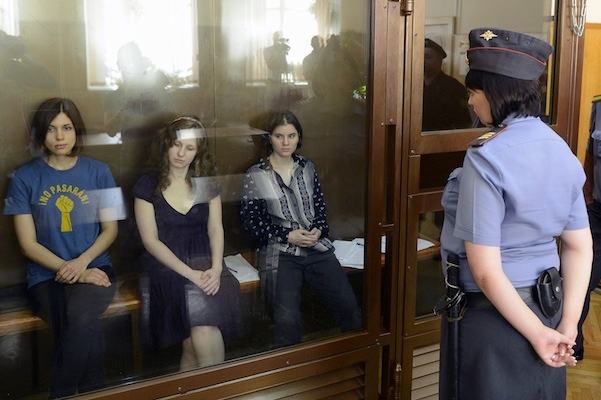It’s hard to tell which is the more absurd over-reaction to Pussy Riot’s 51-second performance of political and religious blasphemy in Moscow’s St Saviour’s Cathedral in February — that of the Russian state or that of the western media.
It should go without saying that the treatment meted out to the three retro-punks — five months’ pre-trial detention at the mercy of unkind jailers, isolation from their families, heavily embroidered charges, their display in an aquarium-style dock under threat of a seven-year maximum sentence before a clearly biased judge — has been cruel, oppressive and grotesquely out of proportion to the offence they committed. But it cannot any longer go without saying. Now that the case has became a liberal cause célèbre, one is required to observe the proper pieties and chant a solemn litany of outrage before the iconostasis. Failure to do so will inevitably result in one being cast as a Putin apologist.
In case you’re still in doubt about my position, let me remove every scintilla of ambiguity. What has been done to the trio was wrong, wrong and viciously wrong. Nadia, Masha and Katya (first names will do now that they’ve been co-opted into celebrity culture) have been cynically used to intimidate the Russian opposition generally, and I’ll happily throw in that President Putin is a nasty, unscrupulous weasel, too, if it helps get us back to the point. Which is this: hasn’t there also been something immoderate about Pussy Riot’s reception by our media, something fulsome and rather distasteful too?
The predictable references in the trial coverage to Kafka and Eugène Ionesco were tolerable, but it was around the third comparison of the Pussy Riot shenanigans with the Dreyfus affair that it became clear that any sense of proportion had been banished. Once the New York Times got in on the act I was yearning for some impossibly old Frenchman to stand up and do a Lloyd Bentsen: ‘I knew Alfred Dreyfus, and you punks are no Alfred Dreyfus!’
A tremendous weight of political significance has been loaded on to Pussy Riot over the past fortnight that the poor performance-art collective seems too flimsy to bear. Commentators assert with all the confidence of cocaine-crazed brokers in a bull market that Pussy Riot will do to Putin’s nationalist strongman populism what the Beatles did to the Soviet system — bring it crashing down. The pre-eminent role of pop music in undermining communism is now, it seems, an unquestioned given; as if economic failure, the nationalities question, Ronald Reagan, Mikhail Gorbachev, and Cruise and Pershing missiles were all just a sideshow.
According to the Observer’s Carole Cadwalladr, Pussy Riot have ‘done more to expose the moral bankruptcy of the Putin regime than probably anybody else. No politician, nor journalist, nor opposition figure, nor public personality has created quite this much fuss. Nor sparked such potentially significant debate.’ Really? It would be nice to think that the Economist’s Edward Lucas had done more than his fair share to expose the moral bankruptcy of the Putin regime in recent years, but then maybe he doesn’t have the leggings, the strut, the balaclava or the public commitment to radical feminism to spark really significant debate or find himself trending on Twitter alongside major public intellectuals such as Pussy Riot. Seventeen Russian investigative journalists have been murdered or disappeared without trace since Putin and the FSB gang took power. Isn’t their silence more eloquent than some punks thrashing guitars outside the Kremlin? And Russia still has some more conventional dissidents — men like the politician Boris Nemtsov and the anti-corruption activist Alexei Navalny. They get arrested from time to time, too. Indeed, Navalny now faces dubious charges of theft. By the time he comes to trial, we in the West may well have squandered all our solidarity reserves on Pussy Riot. That would certainly suit President Putin.
There is, though, something that has been missing from the extensive Pussy Riot narrative: any proper moral reasoning about their protest and the way in which they chose to make it. These punks disrupted a church service, caused offence to worshippers and terrified at least one nun. They jumped up and down close to the altar screeching a mock prayer to the Virgin Mary to ‘get rid of Putin’. Words such as stupid, crass, insensitive and disrespectful come to mind. Why aren’t we using them?
Ordinary Russians appear to have taken rather a different view. Even with the help of some energetic ballot-stuffing at the margins, Vladimir Putin only managed to secure 63 per cent of the vote at the presidential election in March. A very much higher proportion of respondents told Levada Centre pollsters last week that they thought the Pussy Riot protestors should be punished for their antics in the cathedral. In fact, only 2 per cent of those polled said the punks should get off scot free. That means that not just his allies but a huge number of Vladimir Putin’s sworn political enemies felt censorious toward the Pussy Riot defendants and wanted them jailed, fined or forced to do community service.
Although many Russian Orthodox churchgoers would agree with Pussy Riot’s complaint that some of the church’s senior clergy are just as financially corrupt and politically compromised under Putin as they were under communism, they wouldn’t agree that clerical venality was a good enough excuse for disrupting prayers or mocking the Theotokos. In the West, by contrast, there has been scant acknowledgment that the punks really did anything wrong or even questionable.
Ironically, the main charge brought against the three women in Russia was not some hangover from Tsarist days but a ‘hate crime’ that could have come straight out of today’s western legislative playbook — ‘hooliganism aggravated by religious hatred or hostility’. This was absurdly stiff. What Pussy Riot did was not actuated by malice; but nor was it striking a legitimate blow for secularism. It was the expression of a collective coarsened sensibility, and no amount of political posturing, po-mo blether or media hype can disguise that.






Comments